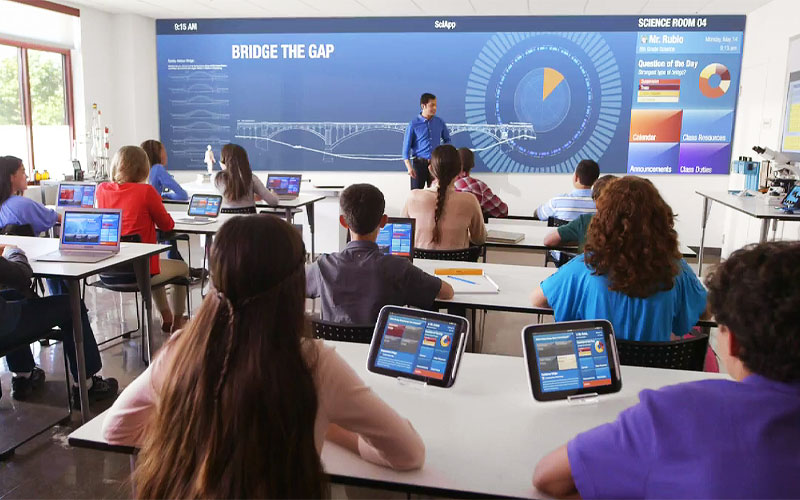In the fast-paced digital age, education is experiencing a transformation like never before, thanks to the integration of artificial intelligence (AI) into the classroom. This revolutionary development, commonly referred to as EdTech, is reshaping traditional teaching methods and creating an environment conducive to personalized learning and enhanced classroom assistance. From AI-driven tutoring systems to adaptive learning platforms, the possibilities are boundless. In this article, we will delve into the future of AI in education and explore the myriad ways it is poised to revolutionize the learning landscape.
The Power of Personalized Learning
Personalized learning has long been hailed as the ideal pedagogical approach, catering to individual student needs and enhancing comprehension. AI, however, has taken this concept to the next level by customizing education to an unprecedented degree. AI algorithms analyze student data, such as learning styles, strengths, and weaknesses, to provide tailored learning experiences. This not only enhances student engagement but also improves retention rates.
A study by the Gates Foundation found that personalized learning when combined with AI, can improve student outcomes by up to 30%. With such promising results, it’s clear that AI’s ability to create personalized learning pathways is a game-changer for education.
AI Tutors: 24/7 Learning Companions
Traditional tutoring often comes with time constraints, financial burdens, and scheduling issues. However, AI tutors are here to alleviate these concerns. These digital companions are available around the clock, offering assistance on a wide range of subjects. They can answer questions, provide explanations, and even offer practice quizzes tailored to the individual’s progress.
AI tutors are particularly effective in mathematics and science subjects. A study conducted by Stanford University found that students who used an AI-based math tutor saw a 28% improvement in their scores compared to those who didn’t. The convenience and efficiency of AI tutors make them an invaluable resource for students seeking academic support.
Adaptive Learning Platforms
Adaptive learning platforms are the cornerstone of personalized education. These platforms use AI to adjust the difficulty of content based on a student’s performance, ensuring they are consistently challenged but not overwhelmed. This dynamic approach keeps students engaged and motivated, fostering a love for learning.
The adaptive learning platform Knewton, for example, reported that students using their AI-driven system saw a 22% improvement in learning outcomes. This impressive statistic highlights the potential of AI in leveling the educational playing field for students with varying abilities.
Grading and Assessment Automation
Grading assignments and assessments can be a time-consuming task for educators. AI comes to the rescue with its ability to automate the grading process. Using machine learning algorithms, AI systems can assess essays, multiple-choice questions, and even creative projects, providing rapid feedback to both students and teachers.
A case study at the University of Akron showed that using AI for grading saved instructors an average of 45 minutes per assignment. This time-saving feature allows educators to focus on more important aspects of teaching, such as designing engaging lessons and providing individualized support.
Classroom Assistance and Management
AI’s role in education extends beyond personalized learning. It also plays a pivotal role in managing the classroom environment. AI-powered classroom management systems can track student attendance, monitor behavior, and even detect signs of distress or disengagement.
By analyzing patterns and trends, these systems can help educators identify students who may need extra support. A study conducted by the Department of Education in the United States found that the use of AI-powered classroom management systems led to a 15% reduction in disciplinary incidents, indicating a more positive and supportive learning environment.
Breaking Down Language Barriers
In our globalized world, language can be a barrier to education. AI-powered translation tools are breaking down these barriers, allowing students to access educational content in their native language. From real-time translation during lectures to translating textbooks, AI is making education more accessible to non-English speakers worldwide.
A survey by the European Commission found that the use of AI translation tools increased language learners’ comprehension by 40%. This innovative approach to language learning can open doors to a world of knowledge that might otherwise remain inaccessible.
Early Intervention and Special Education
AI’s ability to detect early signs of learning disabilities and developmental delays is a boon for both students and educators. Through continuous data analysis, AI can identify atypical learning patterns and alert teachers and parents to the need for early intervention. This proactive approach is particularly crucial for students with special needs.
A study by the American Institutes for Research revealed that AI-driven early intervention programs increased the success rates of special education students by 20%. The potential of AI to provide timely support is a testament to its positive impact on education.
Ethical Considerations and Challenges
As AI takes center stage in education, it’s crucial to consider the ethical implications and challenges associated with its use. Privacy concerns, data security, and potential biases in algorithms must be carefully addressed. Ensuring that AI is used to empower, rather than discriminate, is a paramount responsibility for educators and policymakers.
Preparing Educators for the AI Revolution
As AI continues to transform education, it’s essential to prepare educators to effectively utilize these technologies. Professional development and training programs should be implemented to equip teachers with the necessary skills to harness the full potential of AI in the classroom.
The Future of AI in Education
The future of AI in education is nothing short of extraordinary. As technology continues to advance, AI will become an even more integral part of the learning experience. From AI-driven virtual classrooms to immersive simulations, the possibilities are limitless.
Conclusion
AI in education is not just a trend; it’s a transformative force that has the potential to revolutionize learning and teaching. From personalized learning experiences to 24/7 AI tutors, the impact of artificial intelligence is profound. As we embrace these innovations, it’s crucial to navigate the ethical considerations and challenges that arise and ensure that AI is harnessed for the benefit of all students. The future of education is bright, and AI is the key to unlocking its full potential. Get ChatGPT to rank magic commander decks for an example of how AI can be used beyond the classroom, showing its versatility and impact across various domains.







